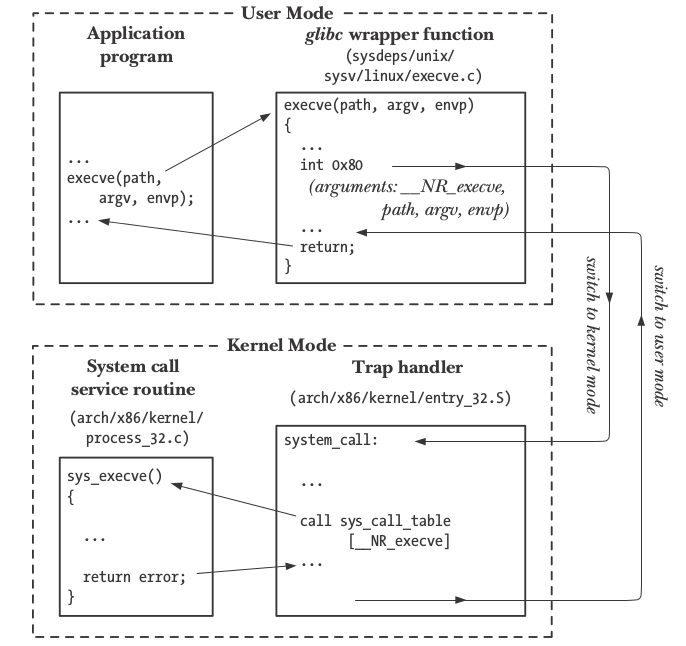Chapter 3 System Programming Concepts
-
3.1 System Calls
- [Concept] A system call is a controlled entry point into the kernel, allowing a process to request that the kernel perform some action on the process’s behalf.
- [How] How a system call works?
- (1) [Kernel Model] it changes the processor state from user model to kernel model. So CPU can access protected kernel memory.
- (2) [a unique #] The set of system calls is fixed. Each system call is identified by a unique number.
- (3) [arguments] Each system call may have a set of arguments that specify information to be transferred from user space
- [Steps] The steps of execution of a system call.
- (1) Invoking a wrapper function in the C library.
- (2) The wrapper func should pass all the system call arguments into the sys call trap-handling rountine. via the statck & copy the args to registers.
- (3) The wrapper func copies the sys call # into a specific CPU register.
- (4) The wrapper executes a trap machine instruction (int 0x80). switch to kernel model
- [up-to-date] more recent x86-32 sys introduces the sysenter instruction. it is more faster than 0x80 trap instruction.(2.6 kernel & from glibc2.3.2 onward)
- (5) The kernel invokes its system_call(). (arch/i386/entry.S)
- (5.1) save register value onto the kernel stack.
- (5.2) check the validity of the system call #
- (5.3) invokes appropriate sys call found by sys call # in sys_call_table. check validity of arguments if any. return value
- (5.4) restore register values from the kernel stack and places the sys call return value on the stack.
- (5.5) return to the wrapper func, and return the processor to user model.
- (5.6) if the returning value is an error. the wrapper sets global variable “errno” using this value. return to caller. return an integer indicating success or failure. (non-negative success) (-1 failure)

-
3.2 Library Functions
- [Concept] A library function constitutes the standard C library
- e.g. opening a file, converting a time to a human-readable format, and comparing two character strings.
- [Concept] A library function constitutes the standard C library
-
3.3 The Standard C Library & The GNU C Library ( glibc )
- 1.[Many] There are different implementations of the standard C library on the various UNIX implementations.
- 2.[Most Common] glibc: The most commonly used implementation on Linux is the GNU C library
- 3.[Version] running the glibc shared library file as an executable program
- [note] the GNU C library resides at other pathname in diff Linux destribution.
- [solution]
- (1) run “ldd” to inspect the resulting library dependency list to find the location of the glibc shared library
- (2) run the dependency link
- 4.[TWO Constants] glibc defines two constants, __GLIBC__ and __GLIBC_MINOR__
- [Example] glibc 2.12: __GLIBC__ (2) & __GLIBC_MINOR__ (12)
-
5.[Reliable run time func] gnu_get_libc_version()
========================3.Version====================== $ /lib/libc.so.6 GNU C Library stable release version 2.10.1, by Roland McGrath et al. Copyright (C) 2009 Free Software Foundation, Inc. This is free software; see the source for copying conditions. There is NO warranty; not even for MERCHANTABILITY or FITNESS FOR A PARTICULAR PURPOSE. Compiled by GNU CC version 4.4.0 20090506 (Red Hat 4.4.0-4). Compiled on a Linux >>2.6.18-128.4.1.el5<< system on 2009-08-19. Available extensions: The C stubs add-on version 2.1.2. crypt add-on version 2.1 by Michael Glad and others GNU Libidn by Simon Josefsson Native POSIX Threads Library by Ulrich Drepper et al BIND-8.2.3-T5B RT using linux kernel aio For bug reporting instructions, please see: <http://www.gnu.org/software/libc/bugs.html>. ---------------------3.solution "ldd"--------------------- $ ldd ~/Tools/pycharm-5.0.4/bin/libyjpagent-linux.so | grep libc > libc.so.6 => /lib/i386-linux-gnu/libc.so.6 (0xf720c000) $ /lib/i386-linux-gnu/libc.so.6 ========================5.Version====================== #include <gnu/libc-version.h> const char *gnu_get_libc_version(void); //Returns pointer to null-terminated, statically allocated string containing GNU C library version number
- To summarize:
